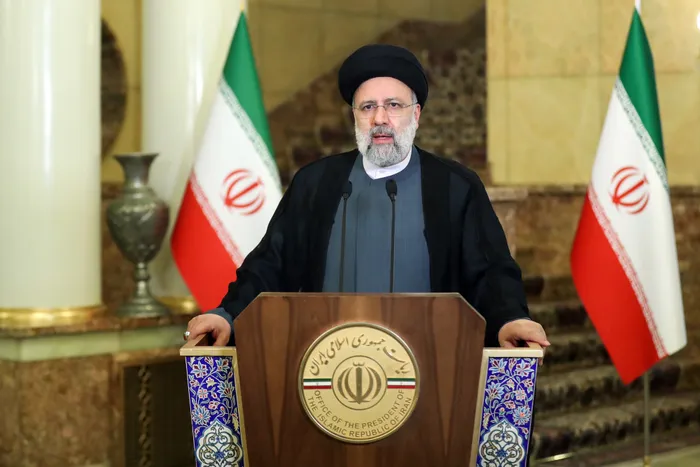Iran says US prisoner swap moving ahead, showing partial thaw in relations

Picture: Iran Presidential Office/via EPA-EFE/Taken September 21, 2021 – Iranian President Ebrahim Raisi. In a prisoner swap today, September 18, 2023, five American detainees held in Iran are expected to travel by plane to Qatar, where they will board a plane for the United States, according to individuals familiar with the negotiations.
By Susannah George
Dubai – A prisoner swap of five American and five Iranian detainees will take place Monday, Iran’s Foreign Ministry spokesperson told reporters, in remarks carried by Iranian media.
Nasser Kanaani did not specify whether any of the detainees had left their respective countries. Once the swap occurs, the American detainees held in Iran are expected to travel by plane to Qatar, where they will board a plane for the United States, according to individuals familiar with the negotiations.
“Two of the Iranian citizens released in America will return to [Iran], and another person will travel to another country due to the presence of their family, and the other two people will remain in the United States,” Kanaani told reporters, according to Iranian state media.
Also Monday, the $6 billion (about R113.8 billion) in Iranian funds previously held in South Korea arrived in Qatari banks, according to Kanaani. The move is a key condition of the swap.
The deal, negotiated over several months, marks a major breakthrough for the bitter foes, who remain at odds over a range of issues, including the rapid expansion of Tehran’s nuclear programme its ongoing military support for Russia and Iran’s harsh crackdown on internal dissent.
The prisoners’ release has also come under harsh criticism from Republicans in Congress opposed to any agreement that involves the unfreezing of Iranian funds. Though the money may be used only for the purchase of humanitarian goods under the agreement, Republicans argue that the Biden administration should have negotiated a deal with more favourable terms for the United States.
The $6 billion had been held in South Korea, one of Iran’s largest oil customers, as a result of a waiver issued by the Trump administration in 2018 that permitted Seoul to continue purchasing Iran’s oil. Those funds became stuck in 2019 when the Trump administration tightened sanctions on Iran.
Over the past week, in preparation for the deal to be finalised, those funds were converted from Korean currency to euros before being moved to accounts in Qatar that can be used only for the purchase of non-sanctioned goods, like food and medicine. US officials say they will continue to have oversight of the money to ensure it is not being used for nefarious purposes.
Before the prisoner deal, the Biden administration’s relations with Tehran were marked by deep distrust, largely over the failure to revive a nuclear deal that Biden had promised to renew when he ran for president. Tehran has refused to talk directly with Washington, requiring third parties to broker discussions.
The United States’ European allies, which broadly support a revised deal to restrain Tehran’s nuclear programme, hope that progress on detainees will pave the way for more productive nuclear discussions.
Iran’s nuclear programme has expanded significantly following the decision by President Donald Trump to pull the United States out of the 2015 nuclear deal. The accord, forged by the Obama administration, imposed strict limitations on Iran’s programme in exchange for sanctions relief.
This article was first published in The Washington Post